Advancing Equity in SPPS
 Dear Colleagues:
Dear Colleagues:
I hope you had an enjoyable spring break, whether you had some time off or spent it working on behalf of our students. I had the pleasure of attending our American Indian Education Program’s first powwow in three years at Harding High School, and it was heartwarming to see the community be able to gather together after so long. I also testified in front of the Minnesota House Education Finance Committee about the chronic underfunding of English learner and special education services, and about our efforts to provide training and licensure for BIPOC educators.
Whether I am speaking at events such as these, in meetings with our Board, or working with community partners and stakeholders, I try to frame everything I do through the lens of systemic equity. More than words in our strategic plan, equity must be practiced every day. It may not always be overt or at the forefront, but all of us should be thinking about, talking about, and doing equity work on a regular basis. If you aren’t, you aren’t sure, or you want to do more, lean into a colleague, a mentor or someone else you trust and start the conversation. The SPPS Office of Equity is a great place to begin if you’re looking for resources, policies or professional development opportunities.
What does systemic equity look like at Saint Paul Public Schools? Through SPPS Achieves, this work includes creating and implementing a district equity plan, and providing learning opportunities around fairness, justice and educational equity. I want to highlight just a few examples of systemic equity in action right now in SPPS:
Recruitment and retention of teachers of color: SPPS is investing over $3 million of American Rescue Plan funds to proactively recruit and retain more educators of color. This important work has already begun and includes a partnership with Education First, who will support the development of a comprehensive recruitment and retention plan. District staff will host and attend targeted career fairs, partner closely with local universities and Historically Black Colleges and Universities (HBCUs), conduct stay and exit interviews, implement onboarding strategies, and review hiring practices as they relate to diversity and inclusion. If successful, this strategy will result in more educators who reflect the rich diversity of our SPPS community.
In addition, SPPS continues to support our St. Paul Urban Teacher Residency (SUTR) program. SUTR is an innovative teacher preparation program with the University of St. Thomas that provides an opportunity for teacher residents to earn while they learn. The seventh cohort begins in May, with 65% of participants identifying as BIPOC.
Supporting on-time graduation: I don’t need to tell you how much the pandemic has impacted our students, particularly our high schoolers. Graduation rates dropped not only in SPPS but statewide in 2021, with sharper declines for our Black, American Indian, EL students, and students in special education. ESSER/ARP-funded efforts, including special education recovery services, American Indian curriculum development, and additional support for EL students and educators, are currently underway to provide these students with more of what they need to be successful. We are also making credit recovery more accessible by offering support during and after the school day, over the summer and online so students can participate in the way that works best for them. I'm proud that we have been able to enroll over 1,000 students per term in credit recovery this school year.
Other strategies to address inequitable outcomes at our high schools include systematizing the 8/2 block schedule, integration of culturally responsive instruction, and requiring 86 credits to graduate from all of our high schools, putting SPPS in line with state requirements and other districts. Driving these changes is the belief that high school students need better support in the wake of the pandemic, and that they should have equitable opportunities to succeed regardless of where they go to school.
Critical Ethnic Studies: This new course was approved by the Board of Education in December 2021 as a graduation requirement starting with the class of 2025. In this course, students examine their identity, heritage, culture and communities in relation to various power structures, forms of oppression and inequalities that impact their lives, while exploring the collective struggles, resilience and triumphs of these communities.
The Ethnic Studies department is currently collecting curriculum suggestions from students, staff, families and community members to be integrated into this groundbreaking course. I encourage all who are interested to submit your suggestions by the April 29 deadline.
If you are doing work that you feel is moving equity forward, whether in your school, your department or some other way, I would love to hear about it. Systemic equity can only be achieved with intentionality, consistency, and willingness to do the hard and potentially unpopular or uncomfortable work. I know that you, and all of us in SPPS, are well-equipped to take on this ever-important challenge.
In Partnership,

Joe Gothard, Superintendent




